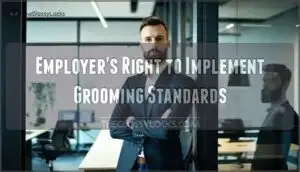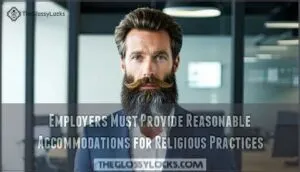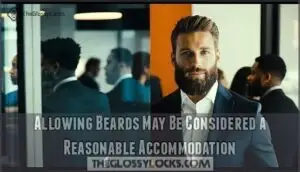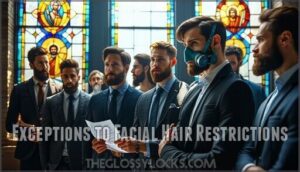This site is supported by our readers. We may earn a commission, at no cost to you, if you purchase through links.
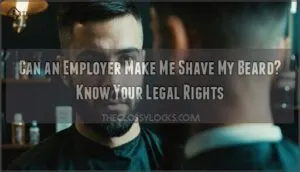
Most companies have the legal right to set grooming standards, yet federal law throws you a lifeline if you’re growing facial hair for religious reasons or medical conditions like severe razor burn.
The question "can an employer make me shave my beard" depends on your specific situation and workplace safety requirements.
Industries using respirators often require clean-shaven faces for proper equipment fit, while office jobs typically have more flexibility.
Your rights vary based on religious accommodations, medical needs, and company policies that balance professional appearance with personal expression.
Table Of Contents
- Key Takeaways
- Can an Employer Make Me Shave My Beard?
- Employer’s Right to Implement Grooming Standards
- Religious Accommodations for Beards
- Medical Accommodations for Skin Conditions
- Balancing Professional Appearance and Self-Expression
- Fairness and Consistency in Enforcement
- Exceptions to Facial Hair Restrictions
- Frequently Asked Questions (FAQs)
- Can I refuse to shave my beard for work?
- Can OSHA make you shave your beard?
- Can an employer force you to shave your face?
- Is it unprofessional to have a beard at work?
- Can employers ban facial hair?
- Can a company shave a beard?
- Do employers have a right to shave facial hair?
- Do you have to shave a beard for a promotion?
- Why do some employees grow beards?
- What is a fit test for masks?
- Conclusion
Key Takeaways
- You’re generally required to follow your employer’s grooming standards, but federal law protects you if you grow facial hair for religious reasons or have medical conditions like severe razor burn that make shaving harmful.
- Religious and medical accommodations are legally required – your employer must work with you to find reasonable solutions unless it creates undue hardship for their business operations.
- Safety-critical jobs can override your beard rights when proper equipment fit is essential, such as positions requiring respirators where facial hair prevents proper sealing and compromises your safety.
- Consistent policy enforcement matters – your employer can’t selectively apply grooming rules, and you have legal recourse through EEOC complaints if you face unfair treatment or discrimination.
Can an Employer Make Me Shave My Beard?
Most employers can require you to shave your beard under facial hair regulations, but you’re not powerless against employer beard policy decisions.
Your employee rights include significant protections when policy challenges arise. If your beard serves religious purposes or you have medical conditions like pseudofolliculitis barbae, federal law shields you from beard discrimination employment practices.
Employers must provide reasonable accommodations unless they prove undue hardship. Safety justification sometimes allows stricter rules—think respirator-wearing jobs where beards compromise equipment seals.
However, if you face unfair treatment, legal recourse exists through EEOC complaints or discrimination lawsuits. The key? Understanding when can employer force shave policies cross legal lines.
Your beard and employment law protections depend on specific circumstances, religious beliefs, medical needs, and consistent policy enforcement across all employees.
Employer’s Right to Implement Grooming Standards
Your boss can legally set workplace grooming standards under at-will employment laws, giving them broad authority over your appearance. Think of it like a dress code for your face – companies establish these facial hair regulations to maintain their professional image and meet safety regulations.
Company appearance policy decisions often stem from business necessity, whether that’s ensuring respirator masks seal properly in hazardous environments or projecting a polished look to customers. Courts consistently uphold employer beard policy rules when they serve legitimate purposes.
However, policy enforcement must be consistent and fair. Here’s what employers typically consider when creating grooming policy legality:
- Customer-facing roles requiring professional presentation
- Safety equipment compatibility in industrial settings
- Food service hygiene requirements
- Healthcare facility sterile environments
- Company branding and image standards consistency
The key? These policies can’t discriminate against protected groups.
Religious Accommodations for Beards
If you grow your beard for religious reasons, you’re protected by federal law that prohibits workplace discrimination based on faith.
Your employer must consider reasonable accommodations for your religious practices, which often includes allowing you to maintain facial hair required by your beliefs.
Federal Law Prohibits Religious Discrimination
Your religious beliefs receive strong federal protection under Title VII of the Civil Rights Act.
The EEOC guidance makes it clear – employers can’t implement neutral policies that discriminate against your faith. If keeping your beard connects to sincere religious beliefs, your employer must consider religious accommodation unless it creates undue hardship for their business operations.
Employers Must Provide Reasonable Accommodations for Religious Practices
Your employer can’t simply ignore your religious beliefs when setting grooming policies.
Federal law requires religious accommodations that don’t create undue hardship. If you hold sincere beliefs requiring facial hair, your boss must work with you to find solutions.
Religious freedom protects your religious practices, and accommodation examples include modified dress codes.
Consider legal consultation for religious discrimination concerns.
Allowing Beards May Be Considered a Reasonable Accommodation
Your religious beard exemption might be the accommodation you need.
Employers must consider reasonable accommodations unless they create undue hardship for business operations.
- Document your beliefs: Submit a formal beard accommodation request explaining your religious practices
- Explore alternatives: Discuss beard alternatives like specialized masks during policy consultation
- Know your rights: Religious exemptions protect sincere beliefs, and medical beard waivers support health conditions
Medical Accommodations for Skin Conditions
Beyond religious protections, your skin deserves equal consideration in the workplace. If you suffer from Pseudofolliculitis barbae (PFB) or other skin conditions that make shaving painful or dangerous, you’re entitled to medical accommodations under the Americans with Disabilities Act.
Your skin condition isn’t just discomfort—it’s a legitimate medical reason that legally protects your right to keep facial hair.
Dermatologist documentation strengthens your case substantially. Your doctor can outline specific treatment options and explain why a medical beard waiver protects your health. Employers must demonstrate policy sensitivity when reviewing legitimate medical requests.
To explore available PFB treatment products, consult online resources.
| Your Medical Rights | Employer’s Response |
|---|---|
| Request accommodation for PFB | Must consider reasonable alternatives |
| Provide medical documentation | Review with HR and legal counsel |
| Propose shaving alternatives | Evaluate business necessity vs. health |
| Maintain professional appearance | Find middle-ground solutions |
PFB accommodations often include keeping trimmed facial hair or using shaving alternatives like electric clippers. Smart employers recognize that protecting employee health while maintaining professional standards isn’t just good business—it’s legally required. Your medical needs matter, and reasonable solutions usually exist.
Balancing Professional Appearance and Self-Expression
You’ll find that most employers can establish grooming policies that serve legitimate business interests, while you retain certain rights to personal expression through your appearance.
The key lies in understanding how courts balance your employer’s need for professional image with your individual rights, particularly when religious or medical considerations come into play.
Employers Have an Interest in Employee Appearance
Companies care about how you look because your appearance reflects their values and brand.
Your facial hair policy connects directly to their business interests:
- Professional Image: Clean-shaven policies maintain consistent appearance standards across teams.
- Customer Perception: Well-groomed employees often inspire greater client confidence and trust.
- Brand Representation: Workplace uniformity reinforces company culture and messaging.
- Competitive Edge: Polished teams can outshine competitors in client-facing situations.
Maintaining a beard requires consistent grooming efforts.
Guidelines Should Address Presentation Concerns Without Overly Restricting Expression
Smart workplace beard rules find the sweet spot between Expression vs. Image.
Balanced Policies with Clear Communication create Inclusive Standards that respect Employee Wellbeing.
You shouldn’t face beard discrimination employment when facial hair policy guidelines are reasonable.
Effective grooming policies protect your employee rights beard while meeting business needs.
Well-crafted workplace beard rules avoid overly restrictive measures that stifle personal identity.
Fairness and Consistency in Enforcement
Looking at professional appearance standards, the next step involves ensuring fairness and consistency in enforcement across your workplace.
When grooming policies aren’t applied equally, employees quickly notice who gets special treatment and who doesn’t. Sporadic enforcement creates workplace tension and opens doors to discrimination claims.
You deserve consistent treatment regardless of your position or relationships with management. Here’s what fair enforcement looks like:
- Clear Communication about policy expectations from day one
- Policy Misinterpretation prevention through regular training sessions
- Favoritism Avoidance by applying rules to everyone equally
- Employee Feedback channels that create an Inclusive Atmosphere
Smart employers recognize that workplace policies work best when everyone understands the reasoning behind them. Addressing fairness enforcement workplace concerns is vital for maintaining morale.
When you can provide input and see consistent application of employee rights, it builds trust and reduces conflicts over discrimination issues.
Exceptions to Facial Hair Restrictions
Even the strictest grooming policies have exceptions. You can’t be forced to shave if you have legitimate religious beliefs or medical reasons. Under federal law, employers must provide reasonable accommodations unless they cause undue hardship to the business.
Religious exemptions cover practices like Sikh beards or Muslim facial hair customs. Documentation needed typically includes a statement from you or your religious leader. The Americans with Disabilities Act ADA protects employees with skin conditions like pseudofolliculitis barbae, where shaving causes painful irritation.
Accommodation examples include allowing trimmed beards, providing alternative safety equipment, or adjusting work assignments. However, policy limitations exist when safety overrides personal preferences. In hazardous environments requiring respirators, employers may deny exemptions if facial hair prevents proper equipment sealing.
Medical reasons require doctor’s notes confirming the condition. Remember, accommodations must be reasonable—employers aren’t required to eliminate all grooming standards. Understanding these exceptions helps you navigate workplace policies while protecting your rights.
Frequently Asked Questions (FAQs)
Can I refuse to shave my beard for work?
Your facial hair isn’t automatically doomed!
You can absolutely refuse shaving if you’ve got religious beliefs, medical conditions like pseudofolliculitis barbae, or safety concerns don’t genuinely require it at your workplace.
Can OSHA make you shave your beard?
OSHA can’t directly force you to shave, but they require employers to guarantee proper respirator fit.
If your beard prevents a tight seal on safety equipment, you’ll need to shave or find alternative protection.
Can an employer force you to shave your face?
Yes, your employer can generally require you to shave your face under at-will employment laws. However, they must provide reasonable accommodations for religious beliefs or medical conditions that prevent shaving.
Is it unprofessional to have a beard at work?
Like Hemingway’s rugged charm, beards aren’t inherently unprofessional.
Your workplace culture determines acceptability. Many industries now embrace facial hair as part of personal expression.
Consider your company’s dress code and client expectations when deciding.
Can employers ban facial hair?
Employers can generally ban facial hair through grooming policies, but they must provide reasonable accommodations for religious beliefs and medical conditions.
Safety requirements in certain industries may also justify such restrictions.
Can a company shave a beard?
A company can’t physically shave your beard themselves – that would be assault.
However, they can require you to shave it as a condition of employment, though religious and medical exemptions may apply.
Do employers have a right to shave facial hair?
Private companies can’t physically shave your facial hair, but they can require you to do it yourself or face disciplinary action.
Including termination, unless you have religious or medical protections requiring reasonable accommodation.
Do you have to shave a beard for a promotion?
You’re not required to shave your beard for a promotion unless it’s a legitimate safety requirement or written into your employment contract. Religious and medical accommodations must still be honored.
Why do some employees grow beards?
You might grow a beard for personal style, religious beliefs, medical conditions like pseudofolliculitis barbae, or simply because you prefer how you look. It’s often about self-expression and comfort.
What is a fit test for masks?
A fit test checks if your respirator or mask seals properly against your face.
You’ll breathe specific test agents while wearing the mask to verify no leaks that could compromise protection.
Conclusion
Ultimately, the question "can an employer make me shave my beard" isn’t a simple yes or no answer.
Your employer’s grooming policies must balance legitimate business needs with your constitutional rights.
Religious beliefs and medical conditions often provide strong legal protections against mandatory shaving requirements.
However, safety-critical positions may override these accommodations when employee welfare is at stake.
Understanding your specific situation, company policies, and applicable federal protections guarantees you’re prepared to navigate workplace grooming standards confidently and legally.
- https://www.businessmanagementdaily.com/37090/close-shave-is-it-legal-to-set-a-no-beard-policy-for-male-staff/
- https://www.quora.com/Can-an-employer-tell-you-to-shave-your-beard
- https://www.askalawyeroncall.com/employment-law/h4vel-employer-force-shave-beard-respirator.html
- https://ravenlaw.com/shaving-your-covid-19-beard-%E2%80%95-can-your-employer-make-you-do-it/
- https://www.twistedmoustache.co.uk/beard-discrimination-in-the-workplace

